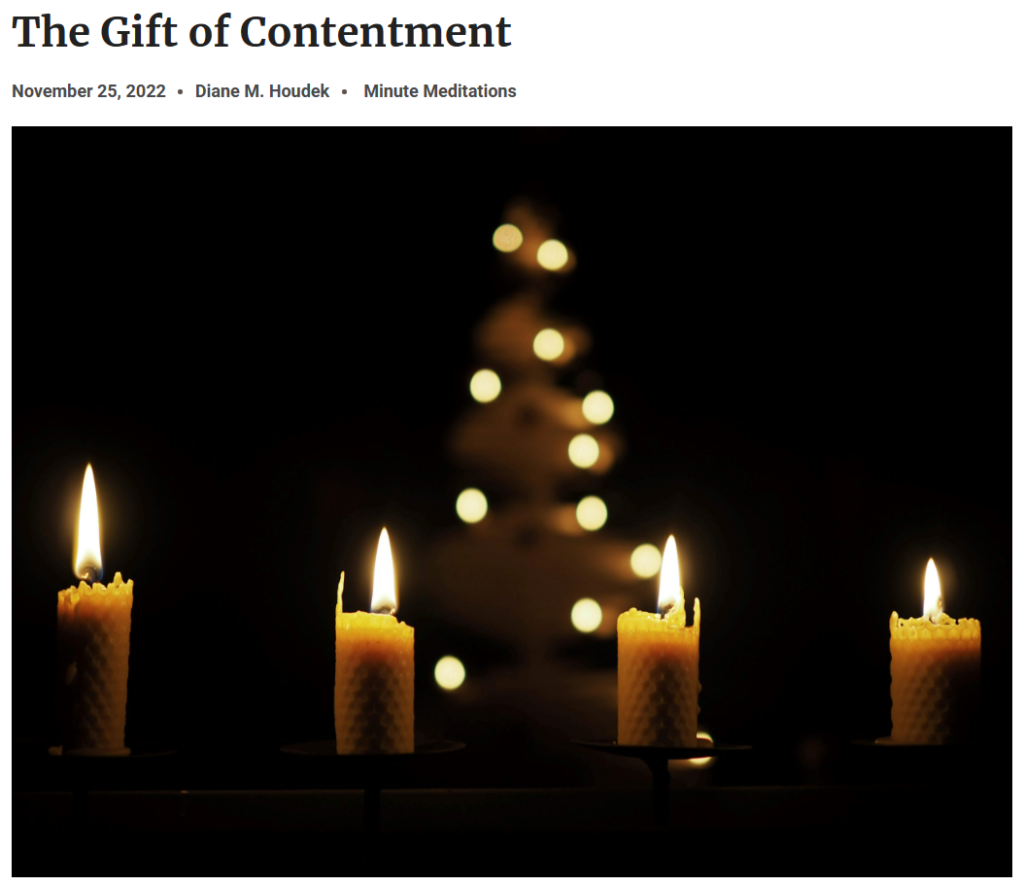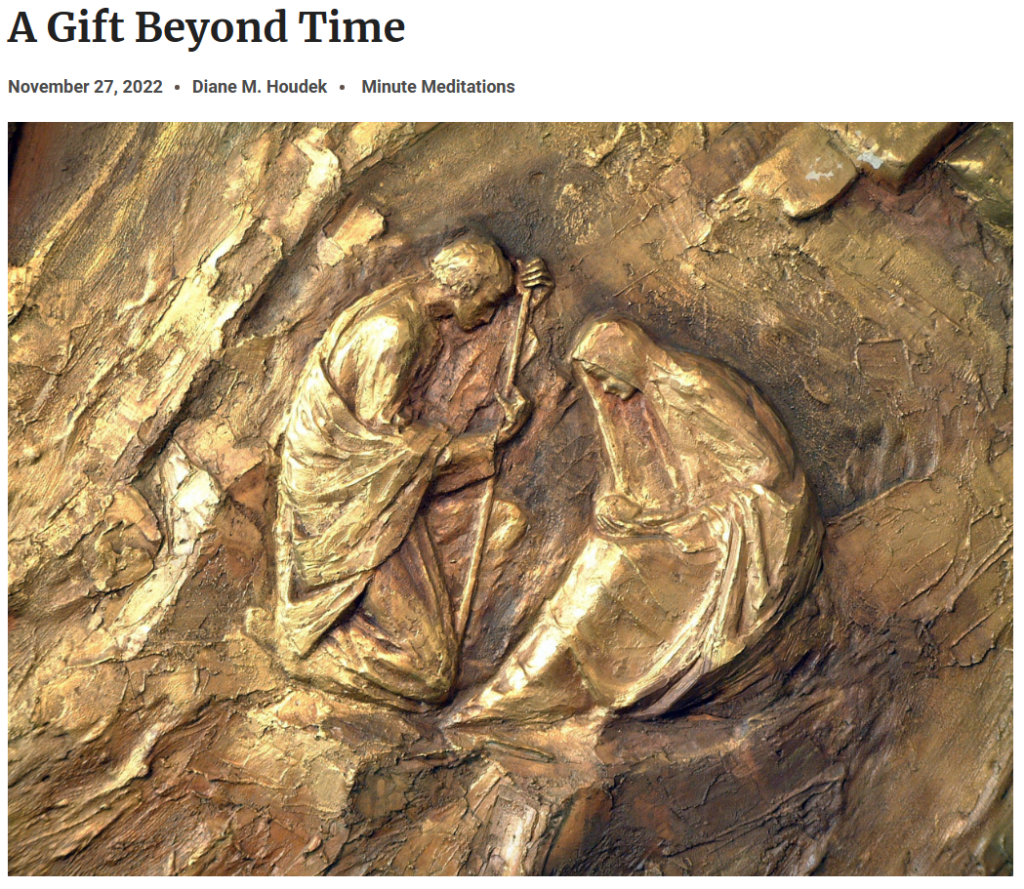
//Bob Holmes – Contemplative Monk//

416 N 2nd St, Albemarle NC 28001 | (704) 982-2910

//Bob Holmes – Contemplative Monk//

We as human persons are made with infinite desires that only God can fulfill. But because we’re fallen, we tend to live at the level of our superficial desires—desires for comfort, fun, fame, wealth, pleasure, success. These desires are not bad, but the rosary helps us be more aware of the soul’s deepest desires, which are for God. As St. Catherine of Siena taught, the greatest gift we can give to God in prayer is not the finite work of saying the words but our “infinitely desirous love” for God that is expressed in those words and that is being drawn out of our souls in prayer.
— from the book Praying the Rosary Like Never Before: Encounter the Wonder of Heaven and Earth
by Edward Sri


Our holiday celebrations often keep us indoors. In northern climates, this might be partly because the cold and snowy weather makes going outside a difficult and even unpleasant experience. We hurry from house to car and then into another warm house. In warm climates, the heat finds us scurrying between air conditioned buildings. But creation—including the weather— is a gift to be celebrated, not something simply to be controlled and altered. We lose our sense of wonder in nature when we become too absorbed in the structures of everyday life. Most of us have jobs and other responsibilities that keep us indoors. The people of the Bible lived much closer to the land than we do today. Navigating by the stars was something they did as a matter of course. Jesus’s parables reflect a deep knowledge of flocks, fields, and fishing. We can understand these stories better if we grow in our awareness of creation. Pope Francis, like his namesake, St. Francis of Assisi, calls us to read God’s presence not only in our holy books but in the holiness of the world around us, plant and animal as well as human.
—from the book The Peace of Christmas: Quiet Reflections from Pope Francis
by Diane M. Houdek
//Franciscan Media//

The gifts we give are ultimately about the receiver, not about the giver. How often when we’re giving gifts do we think about how the gift will reflect on us, our great taste, our generosity, our discretionary income? Much of this stems from insecurity, a fear that we’re somehow not enough in ourselves, that what we do and how much we make and the gifts we give bolster our sense of self. But the peril of this approach is that we’re bound to be disappointed by the receiver’s reaction, no matter how much they thank us. The Christmas holidays often surface doubts and insecurities that we ignore the rest of the year. It might be the stress of extra activities, more spending than we’re accustomed to, less sleep than we need, more food and drink than we should have. We see people we haven’t seen in several months, perhaps not since last Christmas, and we wonder what they think of us. Family gatherings can raise tensions as well. The wonder of the birth of Jesus is balanced by a darker reality: We are all broken and marginalized in some way. We are called to see the mercy and forgiveness that are such an essential part of the incarnation. The peace we can’t find in our daily life is waiting for us in the love of God, a love so clearly shown in the gift of Jesus.
Treat yourself to a little soul-searching. We usually know what fault we most need to work on in ourselves. Minor issues can often be dealt with through some reflection and journaling, being honest with ourselves, and making a commitment to work on our bad habits. More serious issues might need some counseling or therapy. That could be the best Christmas gift you could give yourself. Many churches have special reconciliation services during the Advent season; if you’re so inclined, you might want to attend one, with or without individual confession. A peaceful heart is one of the greatest gifts of Christmas.
—from the book The Peace of Christmas: Quiet Reflections from Pope Francis
by Diane M. Houdek
//Franciscan Media//

The gifts we give are ultimately about the receiver, not about the giver. How often when we’re giving gifts do we think about how the gift will reflect on us, our great taste, our generosity, our discretionary income? Much of this stems from insecurity, a fear that we’re somehow not enough in ourselves, that what we do and how much we make and the gifts we give bolster our sense of self. But the peril of this approach is that we’re bound to be disappointed by the receiver’s reaction, no matter how much they thank us. The Christmas holidays often surface doubts and insecurities that we ignore the rest of the year. It might be the stress of extra activities, more spending than we’re accustomed to, less sleep than we need, more food and drink than we should have. We see people we haven’t seen in several months, perhaps not since last Christmas, and we wonder what they think of us. Family gatherings can raise tensions as well. The wonder of the birth of Jesus is balanced by a darker reality: We are all broken and marginalized in some way. We are called to see the mercy and forgiveness that are such an essential part of the incarnation. The peace we can’t find in our daily life is waiting for us in the love of God, a love so clearly shown in the gift of Jesus.
Treat yourself to a little soul-searching. We usually know what fault we most need to work on in ourselves. Minor issues can often be dealt with through some reflection and journaling, being honest with ourselves, and making a commitment to work on our bad habits. More serious issues might need some counseling or therapy. That could be the best Christmas gift you could give yourself. Many churches have special reconciliation services during the Advent season; if you’re so inclined, you might want to attend one, with or without individual confession. A peaceful heart is one of the greatest gifts of Christmas.
—from the book The Peace of Christmas: Quiet Reflections from Pope Francis
by Diane M. Houdek
//Franciscan Media//

Advent is a good time to reflect on the many gifts we already have, and even on the many material things that make our lives more pleasant and less difficult. But we don’t have to be very far along in the spiritual life to understand that having more isn’t going to fill an emptiness in our souls. Contentment is a great gift that we don’t always appreciate. It’s not as rare as we might think. Instead of asking whether we’re happy, perhaps we can get into the habit of asking how content we are. Contentment has in it an element of peace that’s greatly needed in our lives and in our world today. And the more content we are with what we possess, the more likely we are to hold those things lightly and to give to those whose needs are greater and more genuine than our passing desires. The prophet Isaiah speaks of prosperity and success being like a river or the waves of the sea: infinite but constantly in motion. We are to hold our treasures lightly, knowing that they come from God.
— from the book Simple Gifts: Daily Reflections for Advent
by Diane M. Houdek
//Franciscan Media//

Advent reminds us that the One who has come into the world and is always coming into our lives in new ways is the source of our salvation. We don’t need novelty and “magic bullet” solutions to our concerns. We simply need to return again and again to the rock-solid foundation of our lives: God and God alone. The mystery of the Incarnation is that by entering into our time and into our world, Jesus can show us the way to the gift that is beyond all time.
—from the book Simple Gifts: Daily Reflections for Advent
by Diane M. Houdek
//Franciscan Media//

To Francis everything in him and around him was a gift from his Father in Heaven. He expected nothing, so he was grateful for everything. Even a piece of earth was cause for rejoicing, and he thanked God always for everything that was. He held everything to his heart with the enthusiasm of a child surprised by some unexpected toy. The air he breathed, the sounds he heard, the sights and smells of all the world entered his grateful soul through senses perfected by gratitude and purity of heart.
Nothing was evil, for everything came from God, and evil came only from a heart that chose not to love. The heart through passion or selfishness or pride could choose not to love and that was evil, but no thing or no person was evil in and of itself. When Francis passed people on the road or met them on their doorsteps as he begged, he could not hide his delight in them, in their very existence. All people to Francis were good gifts to brighten his day with the mystery of their unique personalities.
—from the book Francis: The Journey and the Dream
by Murray Bodo, OFM, page

We are told that in the beginning there was light. Ever since, all of God’s creation—plants, animals, we humans—are drawn to light. As we emerged from our mothers’ wombs and pushed our way through a dark and confining birth canal, we experienced light for the very first time. We have come to learn how light sustains us and calls us to life. We call Jesus “Light of the World,” and he invites us to be light for one another in ways of loving, caring, and serving. Without this light, ours would be a dark, fearful, oppressive journey.
Move from contemplation to action and probe for inner wisdom. What kind of light do others see in you? Do you have enough light to see your way? How do you fill the oil in your lamp? Who needs you today to bring a bit of sunshine into their life? As you generously share your light, give thanks and praise in knowing and treasuring all that is gift.
— from the book Eucharistic Adoration: Reflections in the Franciscan Tradition
by the Franciscan Sisters of Perpetual Adoration
//Franciscan Media//